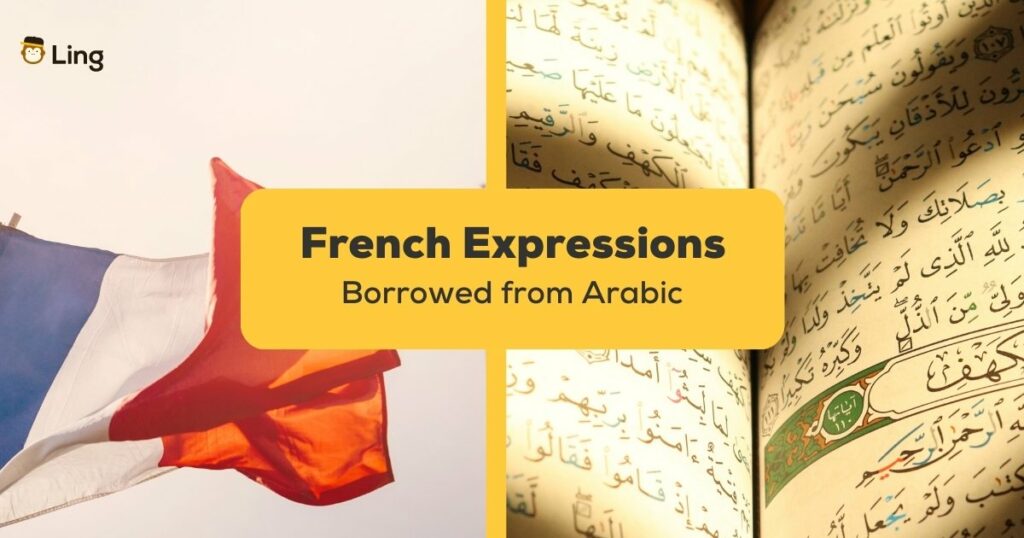Bonjour, language enthusiasts! We’re back with something that’s sure to capture your interest. Have you ever noticed how languages tend to borrow from each other? It’s a great example of cultural exchange and language fluency.
Today, let’s dive into an exciting blend of cultures as we explore ten French expressions that have been borrowed from Arabic.
This linguistic crossover is particularly noticeable among young people, who often incorporate these expressions into everyday conversations. Whether to sound cool or add some extra flavor to their language, these words have become an integral part of French slang, or ‘argot.’
If you’re learning French, understanding these expressions can keep you updated and make a good impression on your friends.
What Are Some French Expressions Borrowed From Arabic?
1. C’est kif-kif:
It is borrowed from the Arabic word ‘kif,’ meaning ‘like’; this phrase is used to say that two things are the same, or it’s all the same to you.
So, if a friend can’t decide whether to get chocolate or vanilla ice cream, you might say, ‘C’est kif-kif!’ to express it doesn’t really matter – both are equally good.
P/s: Young French people also use the verb ‘kiffer’ a lot to show their interests.
For example, J’ai trop kiffé ce film. (I loved this movie too much.)
2. Avoir le seum
In Arabic, ‘seum’ translates to poison. In French, however, ‘avoir le seum’ means upset or annoyed, often used among young people. For instance, if your favorite team loses a match, you might ‘avoir le seum.’
Lucas: Tu sais, j’ai raté mon examen de mathématiques. (You know, I failed my math exam.)
Léa: Ah non, tu dois avoir le seum ! Ne t’inquiète pas, tu te rattraperas la prochaine fois. (Oh no, you must be really upset! Don’t worry, you’ll catch up next time.)
3. Wesh
A greeting borrowed from Arabic, ‘wesh’ can be used as a casual ‘hello’ or ‘what’s up.’ It’s a staple of the French youth vocabulary.
Julien: Wesh, ça va? (Hey, how’s it going?)
Antoine: Wesh, ouais, ça va et toi? (Hey, yeah, it’s going well, and you?)

4. Toubib
This word is used in French to refer to a doctor. It comes from the Arabic word ‘tabib’ with the same meaning.
Jules: Je ne me sens pas bien, je pense que je devrais aller voir un toubib. (I’m not feeling well, I think I should go see a doctor.)
Marie: Oui, tu as l’air malade. Tu devrais prendre rendez-vous. (Yes, you look sick. You should make an appointment.)
5. Bled
In Arabic, ‘bled’ means country or village. In French slang, it’s often used to refer to one’s hometown or home country, particularly the ancestral homes of individuals from North Africa living in France.
6. Miskine
Derived from the Arabic word for ‘poor,’ ‘miskine’ is used in French to express sympathy or pity, similar to saying ‘poor thing.’
Here’s an example:
Camille: Tu as entendu? Max a perdu son emploi. (Did you hear? Max lost his job.)
Youssef: Ah, miskine. J’espère qu’il trouvera quelque chose d’autre rapidement. (Ah, poor thing. I hope he finds something else quickly.)
7. Kebab
While this word refers to a popular dish in Arabic and Turkish cultures, in French, it’s used to refer to a fast-food sandwich, similar to a gyro or shawarma.
8. Beur
‘Beur’ is a term used in French slang (verlan, a form of French slang where syllables of words are reversed) to refer to a person of North African origin, particularly those living in France. The term is derived by reversing the syllables in the word ‘Arabe,’ which means Arab.
Jean: Il y a beaucoup de diversité culturelle dans notre quartier, il y a des beurs, des asiatiques, des africains. (There’s a lot of cultural diversity in our neighborhood, there are Arabics, Asians, Africans.)
Sophie: Oui, c’est ce qui rend notre quartier si intéressant et dynamique.
(Yes, that’s what makes our neighborhood so interesting and dynamic.)
9. Hlel
Borrowed from the Arabic word ‘halal,’ ‘hlel’ in French slang refers to someone good or virtuous.
Fatima: Est-ce que tu sors toujours avec Karim? (Are you still going out with Karim?)
Leila: Oui, c’est mon hlel maintenant. On pense même à se marier.
(Yes, he’s my hlel now. We’re even thinking about getting married.)
10. Chouf
‘Chouf’ comes from the Arabic word for ‘look.’ In French, it’s used similarly to draw attention to something.
Yasmine: Chouf, c’est la nouvelle voiture de Samir. (Look, that’s Samir’s new car.)
Nadia: Wow, elle est vraiment belle! (Wow, it’s really nice!)
This list is just a glimpse of the interaction between French and Arabic, showing how languages can adapt and evolve through cultural exchange.
Although some of these expressions are more colloquial and more common in informality, they reflect the vibrant multicultural fabric of French society.
So next time you’re practicing your French, why not try failing one of these phrases? Not only does it add a bit of authenticity to your speech, but it’s also a fun way to interact with the dynamic and evolving nature of language.
By: Minh Cuong from Romanlangpassion.com
































































